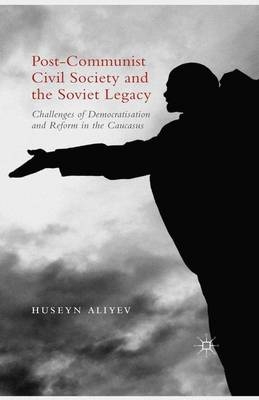
Post-Communist Civil Society and the Soviet Legacy
Palgrave Macmillan (Verlag)
978-1-349-56938-0 (ISBN)
- Titel wird leider nicht erscheinen
- Artikel merken
List of Figures and TablesNote on TransliterationPreface List of Abbreviations Introduction Outline of the argument Relevance of research Case study: CaucasusSources of dataOverview of contents PART I: DEMOCRATISATION, CIVIL SOCIETY AND COMMUNIST LEGACIES 1. Democracy In The Caucasus And The Former Soviet Union2. Structural Democratisation 3. '' ''Transition '' '' Theories4. Civil Society, Social Capital And Networking 5. Why Is Civil Society Important?6. What Is Civil Society?7. Social Capital 8. Informal Networking 9. What Determines The Development Of Civil Society?10. Political System 11. Armed Conflicts12. Economic Well-Being 13. Antecedent Regime '' ''s Legacy 14. Post-Totalitarian Legacy 15. Soviet Legacy: Conceptual And Analytical Baseline16. Conclusion PART II: HISTORY OF CIVIL SOCIETY IN THE CAUCASUS17. Pre-Communist Civil Sector18. The Caucasus '' ''s Civil Sector Under Soviet Rule19. Public Sphere Of Soviet Society20. Soviet Private Sphere 21. Sovietisation22. '' ''Neformaly '' '' 23. Perestroika And The Birth Of Nationalist Civil Society24. Conclusion PART III: POST-COMMUNIST CIVIL SOCIETY25. The Post-Communist NGO Sector26. Overview Of The NGO Sector 27. Weaknesses Of The NGO Sector28. Membership And Participation 29. Distribution 30. Popular Trust Towards Ngos31. Operational Structure 32. Ngos '' '' Patron-Client Relations33. Post-Communist Informal Networks In The Caucasus34. Types Of Informal Networks 35. Informal Networks As Providers Of Public Goods36. Limits Of Informal Networking 37. Indigenous Social Capital 38. Conclusion PART IV: SOVIET LEGACY AND CIVIL SOCIETY39. Legacy Of The Soviet Public Sphere40. Institutional Legacy41. Individual Legacy42. Continuity Of Civic Traditions43. Informal Networks As Soviet Legacy44. How And Why Do Informal Civic Traditions Continue?45. Conclusion PART V: ALTERNATIVE EXPLANATIONS46. Political System47. Impact Of Political System On Formal Civil Society48. Political System And Informal Networks49. Armed Conflicts50. Economic Well-Being51. Conclusion Conclusion Alternative ExplanationsContributions And Implications NotesBibliography Index
| Erscheinungsdatum | 26.05.2016 |
|---|---|
| Zusatzinfo | Bibliography |
| Sprache | englisch |
| Themenwelt | Recht / Steuern ► EU / Internationales Recht |
| Sozialwissenschaften ► Politik / Verwaltung ► Politische Systeme | |
| Sozialwissenschaften ► Soziologie ► Spezielle Soziologien | |
| Schlagworte | communism • conflict • Democracy • Institution • Networks • NGO • Non-governmental organizations (NGOs) • Participation • Social capital |
| ISBN-10 | 1-349-56938-0 / 1349569380 |
| ISBN-13 | 978-1-349-56938-0 / 9781349569380 |
| Zustand | Neuware |
| Haben Sie eine Frage zum Produkt? |
aus dem Bereich


